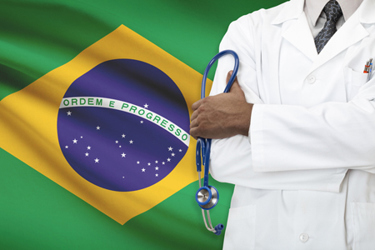BeiGene Explains The Landscape Of Oncology Trials In Brazil
By Lígia Campos, director, clinical operations head Brazil and LATAM, BeiGene

With a diverse and growing population of over 203 million, Brazil faces significant cancer challenges, including disparities in care, educational and socioeconomic factors, and limited access to advanced treatments. By establishing a dedicated local clinical operations team in Brazil in mid-2022, BeiGene has committed to bridging these gaps and fostering patient-centered care. In just two years, it launched more than 10 clinical studies, enrolling over 200 patients — a testament to the team's adaptability, operational excellence, and strategic vision for Brazil. Discover how — by collaborating with principal investigators, clinical sites, and regulators to streamline study start-up and approval processes and by leveraging a CRO-free operational model — BeiGene has driven cost efficiency and accelerated trial timelines while solidifying Brazil's position as a critical hub for oncology research in Latin America. In part one of this series, learn about the cancer prevalence and treatment approaches in Brazil, as well as the benefits and challenges — to both Brazilian patients and sponsors — in conducting trials in Brazil.
Understanding Cancer Prevalence And Treatment In Brazil
Brazil, the fifth most populous country in the world, with a diverse population in which 45.3% of the population identified as "mixed-race" or "pardo," is projected by the Brazilian National Cancer Institute (INCA) to report over 704,000 new cancer cases annually from 2023 to 2025, excluding non-melanoma skin cancers. Unfortunately, in Brazil, there are significant disparities in cancer care. Brazilian patients who receive timely and appropriate treatment have outcomes comparable to those in high-income countries. However, patients in public healthcare generally experience shorter disease-free survival (DFS) compared to those in private care. Educational and socioeconomic disparities also play a role. Lower educational attainment is often linked to poorer health literacy and delays in seeking medical care, which are further exacerbated by longer intervals between the onset of symptoms and the first medical consultation. Ethnic and racial disparities persist as well. Even when adjusted for income, studies indicate that Black and brown women have significantly lower 10-year survival rates for breast cancer compared to white women. This disparity is partly due to a higher proportion of advanced-stage diagnoses among Black and brown women.
In addition, cancer mortality rates in Latin America are approximately double those in the United States, positioning cancer as the second leading cause of death in the region. Effective cancer management necessitates a multidisciplinary approach and increasingly relies on precision therapies, both of which pose significant challenges in low- and middle-income countries. A study by the Latin American Cooperative Oncology Group (LACOG) revealed that despite high cancer incidence in Brazil, physician participation in clinical trials is low due to limited trials, regulatory delays, and inadequate research staff, highlighting the need for increased physician engagement and patient education to boost trial recruitment and expand research opportunities.
The globalization of clinical trials, as well as multinational and multi-institutional research collaboration, represents a scenario that requires permanent and concentrated efforts. Financial support within low- and middle-income countries may differ substantially from the support needed in high-income countries. For example, what might be considered “routine” or “standard of care” in other countries may not apply to Brazil. A large part of this is explained by the Brazilian healthcare system, which has a very large public health component. Indeed, only 25% of the adult Brazilian population can afford private healthcare. In Brazil, access to medications and the availability of new cancer therapies for the public can be significantly delayed due to several factors: regulatory and approval processes, public health system and funding, economic and market dynamics, and clinical trial and evidence generation, among others. Providing access is a priority, and such factors must be kept in mind. In addition, “standard treatments” used in the control arms of randomized trials might not have local regulatory approval, incurring other issues related to treatment access.
Still, Brazil stands out as one of the 25 countries with the greatest development of clinical trials sponsored by biopharmaceutical companies as a result of its recruitment capacity, trained professionals, adaptations of technology parks, and local regulations for the protection of human beings. However, research activities are still limited to a few investigators and a few academic centers.
What Brazil Offers And Stands To Gain In Clinical Research
With exceptional medical expertise, well-equipped and highly qualified sites, and a significant unmet need in oncology due to the current healthcare system configuration, Brazil and other Latin American countries are well positioned as highly promising regions for hosting more globally sponsored clinical trials. BeiGene’s global health mission to develop medicines that are accessible to more patients worldwide aligns directly with addressing the challenges faced in Brazil. As part of the organization's end-to-end, lab-to-market strategy to expand into new markets, bringing clinical studies to the region is a crucial step to engage the medical community and establish a stronger presence.
Healthcare providers (HCPs) involved in clinical trials are often more knowledgeable and comfortable with the investigational products being studied. This familiarity can significantly impact their prescribing decisions once those products are commercially approved, as they are more likely to incorporate these therapies into their practice, promote evidence-based adoption, and influence peers through their firsthand experience and expertise gained during trials.
BeiGene's operational model and CRO-free philosophy offer agility and significantly reduce clinical trial costs. Despite being challenging to discuss the cost per patient in clinical trials, as this figure is influenced by numerous factors, a 2021 publication indicates that the estimated cost per patient in oncology trials ranges from $100,271 to $155,714. Low- and middle-income countries offer a promising alternative for reducing these costs. For instance, Brazil typically demonstrates costs that are approximately 56% lower than those in the U.S. This not only makes Brazil an attractive destination for clinical research but also highlights the country's potential to significantly contribute to global advancements in oncology and hematology through efficient, cost-effective, and high-quality clinical trials.
In part two of this series on expanding oncology trials into Brazil, BeiGene shares the steps it took to establish clinical operations, starting with a new, localized team.
About The Author:
 Lígia Campos has over 17 years of experience in clinical research and operations in the pharmaceutical industry. As director, clinical operations head for Brazil and LATAM at BeiGene, she has played a key role in establishing and expanding the company’s clinical operations in the region.
Lígia Campos has over 17 years of experience in clinical research and operations in the pharmaceutical industry. As director, clinical operations head for Brazil and LATAM at BeiGene, she has played a key role in establishing and expanding the company’s clinical operations in the region.
Previously, Lígia held leadership roles at Novartis Oncology, where she oversaw clinical operations, real-world evidence initiatives, and strategic evidence generation to support product launches and market access. Her expertise includes regulatory submissions, patient recruitment strategies, and building collaborations with key stakeholders across LATAM. With a background in pharmacy, Lígia has worked across diverse therapeutic areas, particularly oncology, driving clinical trial efficiency and operational excellence.
